
Jersey Boys, the 13th longest running show in Broadway history no less, is now making its triumphant return to Southern California with a three-week stop at Costa Mesa’s Segerstrom Center For The Arts after a seven-year absence, and that, musical theater (and Four Seasons) lovers, is cause for celebration.
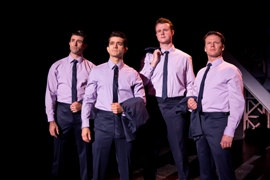 Though often credited as the Broadway show that breathed new life into the then floundering “jukebox musical” (the “Beach Boys musical” Good Vibrations having flopped only months before Jersey Boy’s 2005 Broadway debut), the infinitely more successful “Four Seasons musical” might more properly be dubbed a bio-dramedy … with a few dozen Top Forty hits thrown in for zing.
Though often credited as the Broadway show that breathed new life into the then floundering “jukebox musical” (the “Beach Boys musical” Good Vibrations having flopped only months before Jersey Boy’s 2005 Broadway debut), the infinitely more successful “Four Seasons musical” might more properly be dubbed a bio-dramedy … with a few dozen Top Forty hits thrown in for zing.
Jersey Boys book writers Marshall Brickman and Rick Elice break from the Mamma Mia!/All Shook Up/Good Vibrations model by opting not to link Bob Gaudio and Bob Crewe’s songs with a fictional plot but rather to create what is essentially a biographical play with only a handful of its songs used to advance its Four Seasons/Frankie Valli storyline: “December, 1963 (Oh, What a Night),” to celebrate the loss of Frankie’s virginity; “My Eyes Adored You,” to reveal Frankie’s pain at his first divorce; and “Fallen Angel,” in response to the tragic death of someone near and dear to Frankie.
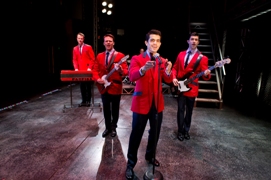 The other ‘60s singles, enough to fill a Four Seasons’ Greatest Hits 2-disc LP, are mostly performed as the Seasons did themselves throughout the 1960s—in recording studios, clubs, and concerts, and on TV variety shows—and what a Greatest Hits collection they make, highlighted by the group’s five Number One chart-toppers “Sherry,” “Big Girls Don’t Cry,” “Walk Like A Man,” and “Rag Doll,” and the aforementioned “December, 1963 (Oh, What a Night).”
The other ‘60s singles, enough to fill a Four Seasons’ Greatest Hits 2-disc LP, are mostly performed as the Seasons did themselves throughout the 1960s—in recording studios, clubs, and concerts, and on TV variety shows—and what a Greatest Hits collection they make, highlighted by the group’s five Number One chart-toppers “Sherry,” “Big Girls Don’t Cry,” “Walk Like A Man,” and “Rag Doll,” and the aforementioned “December, 1963 (Oh, What a Night).”
It is, in fact, that final Four Seasons’ Number One that gets things started, Yannick’s 2000 rap-en-français remix “Ces Soirées-Là” opening Jersey Boys with a Vegas-style French-language bang, before original Four Seasons member Tommy DeVito takes us back to the 1950s and the destined-for-pop-stardom group’s Newark, NJ origins.
One of the book writers’ most inspired choices was to tell Jersey Boys in “four seasons,” Spring, Summer, Fall, and Winter narrated Rashomon-style by one of the original Seasons (DeVito, Nick Massi, Bob Gaudio, and the one-and-only Valli), Brickman and Rick Elice’s decision inspired mid-research when the real-life DiVito told them, “Don’t listen to those guys. I’ll tell you what really happened.”
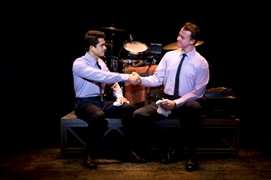 Thus we first get Tommy’s spin on The Four Seasons’ start (including Tommy-&-Nick’s multiple albeit relatively brief incarcerations and their mob connection with mafia boss Gyp DeCarlo), followed by The Gospel According To Bob Gaudio (the songwriting genius whose melodies were one of the two key factors in The Four Seasons’ rise to stardom, the other being the vocal talents of the uniquely gifted Valli.) Original member Nick then assumes the narration, with Frankie at last taking over to recount the events leading up to his solo stardom, before a Bob Crewe-narrated coda reunites the original Four Seasons at their induction into the Rock And Roll Hall Of Fame circa 2000 (which just happens to be the year Yannick released “Ces Soirées-Là”).
Thus we first get Tommy’s spin on The Four Seasons’ start (including Tommy-&-Nick’s multiple albeit relatively brief incarcerations and their mob connection with mafia boss Gyp DeCarlo), followed by The Gospel According To Bob Gaudio (the songwriting genius whose melodies were one of the two key factors in The Four Seasons’ rise to stardom, the other being the vocal talents of the uniquely gifted Valli.) Original member Nick then assumes the narration, with Frankie at last taking over to recount the events leading up to his solo stardom, before a Bob Crewe-narrated coda reunites the original Four Seasons at their induction into the Rock And Roll Hall Of Fame circa 2000 (which just happens to be the year Yannick released “Ces Soirées-Là”).
For a Broadway musical as smash-tastic as Jersey Boys, the nine-years-and-counting hit is surprisingly dark, from Tommy and Nick’s multiple misdemeanor convictions to the group’s mafia connection to Tommy’s mountainous debts to Frankie’s marital woes to the behind-the-scenes tensions that eventually split them up.
That’s not to say that Jersey Boys isn’t a crowd-pleaser of the first order. It is, though on Broadway and on Tour (as in The Four Seasons’ real lives), the joy is not so much in the story of the pop group’s rocky road from rags to riches as in their music.
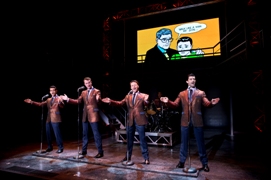 And what joy there is as National Tour stars Nicolas Dromard (Tommy DeVito), Quinn VanAntwerp (Bob Gaudio), Adam Zelasko (Nick Massi), and above all the irresistible Hayden Milanes (Frankie Valli) perform hit after hit after hit to audience cheers and tears.
And what joy there is as National Tour stars Nicolas Dromard (Tommy DeVito), Quinn VanAntwerp (Bob Gaudio), Adam Zelasko (Nick Massi), and above all the irresistible Hayden Milanes (Frankie Valli) perform hit after hit after hit to audience cheers and tears.
With director extraordinaire Des McAnuff at the helm and choreographer Sergio Trujillo giving us those signature ‘60s moves, Jersey Boys moves at a breakneck pace, and sensationally so, a number of sequences proving particular standouts, notably a pair of suspenseful lead-ups to the revelation and subsequent performance of the Seasons’ very first hit and Frankie’s very first solo smash.
The creative team’s decision to end Act One, not with a great big production number—“Dawn (Go Away)”—but with a dramatic cliffhanger, is another of their savvy moves, a reminder that Jersey Boys is ultimately the dramatic true story of four boys from Jersey.
Still, though Brickman and Elice’s book reads like a drama, director McAnuff and his supremely talented design team have opted to stage Jersey Boys with Broadway-musical dazzle.
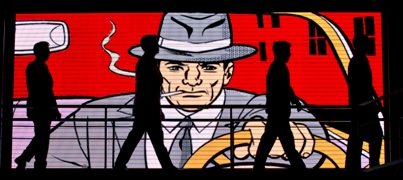 Scenic designer Klara Zieglerova’s Tony-nominated industrial set may appear all black and scaffoldy at first glance, but plenty of flash from neon signs, Michael Clark’s cartoon LED projections, live and vintage B&W footage, and saturated Technicolor backdrops make the production a nonstop visual treat.
Scenic designer Klara Zieglerova’s Tony-nominated industrial set may appear all black and scaffoldy at first glance, but plenty of flash from neon signs, Michael Clark’s cartoon LED projections, live and vintage B&W footage, and saturated Technicolor backdrops make the production a nonstop visual treat.
Dromard, Milanes, VanAntwerp, and Zelasko’s four-part harmonies are every bit as gorgeous as the original pop quartet’s, but each triple-threat gets ample opportunity to strut his dramatic stuff. In fact, rarely has a Broadway musical offered more of a chance for performers to act, and the majority of Jersey Boys’ supporting tracks are—unusually for a musical—dialog-based.
Performances could not be better, from Dromard’s cocky Tommy to Zelasko’s gawky Nick to topnotch supporting turns by Barry Anderson as a deliciously “theatrical” Bob Crewe, Thomas Fiscella lending power and gravitas to mobster Gyp, and the musical’s three fabulous featured females—Jaycie Dotin as the lovely Lorraine, Marlana Dunn as the brassy Mary, and Leslie Rochette as the ill-fated Francine.
Most significantly, there are the two men most responsible for The Four Seasons’ superstardom, the charming, statuesque, golden-piped VanAntwerp as Bob Gaudio and best of all, the sensational, falsetto-blessed Milanes, so utterly winning as Frankie that it’s hard to imagine anyone else in the role, maybe not even Frankie himself.
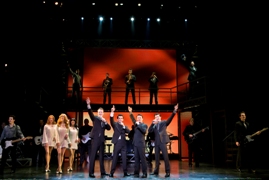 Multiple cameos are brought to vivid life by Tomasso Antico, De’Lon Grant, Brian Reardon LaFontaine, John Rochette, Skye Scott, Mark Verdino, and (at the performance reviewed) by swing Robert J. Townsend as a delightfully feisty Joe Pesci.
Multiple cameos are brought to vivid life by Tomasso Antico, De’Lon Grant, Brian Reardon LaFontaine, John Rochette, Skye Scott, Mark Verdino, and (at the performance reviewed) by swing Robert J. Townsend as a delightfully feisty Joe Pesci.
Ben Hartman conducts the Jersey Boys orchestra, onstage in various configurations and numbers throughout the show, and you won’t find a more exciting bunch of musicians on tour.
The entire behind-the-scenes Broadway team’s contributions are either visible or audible on this 2011-to-now Second National Tour, including Howell Binkley’s flashy, Tony-winning lighting design, Jess Goldstein’s fabulous ‘50s/‘60s costumes, Steve Canyon Kennedy’s Vegas-ready sound design, Ron Melrose’s marvelous musical direction, vocal arrangements, and incidental music, and Charles LaPoine’s period wig and hair design.
Tour-specific credit goes also to production stage manager Matthew Leiner, stage manager Gregory R. Covert, and assistant stage manager Jay Carey.
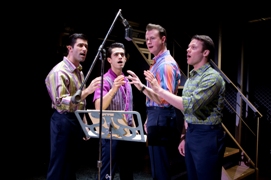 Las Vegas’s relative proximity to Los Angeles and the OC having kept The Four Seasons far, far away for the past half-dozen years, Jersey Boys’ long-awaited return to SoCal (with Orange County’s Segerstrom trumping L.A.’s Pantages by more than three months) is an event of event status—and one any rock ‘n’ roll fan or musical theater enthusiast won’t want to miss.
Las Vegas’s relative proximity to Los Angeles and the OC having kept The Four Seasons far, far away for the past half-dozen years, Jersey Boys’ long-awaited return to SoCal (with Orange County’s Segerstrom trumping L.A.’s Pantages by more than three months) is an event of event status—and one any rock ‘n’ roll fan or musical theater enthusiast won’t want to miss.
Segerstrom Center For The Arts, 600 Town Center Drive, Costa Mesa.
www.scfta.org
–Steven Stanley
June 25, 2014
Photos: Jeremy Daniel
Tags: Bob Gaudio, Frankie Valli, Jersey Boys, Orange County Theater Review, Segerstrom Center For The Arts, The Four Seasons


 Since 2007, Steven Stanley's StageSceneLA.com has spotlighted the best in Southern California theater via reviews, interviews, and its annual StageSceneLA Scenies.
Since 2007, Steven Stanley's StageSceneLA.com has spotlighted the best in Southern California theater via reviews, interviews, and its annual StageSceneLA Scenies.







 COPYRIGHT 2025 STEVEN STANLEY :: DESIGN BY
COPYRIGHT 2025 STEVEN STANLEY :: DESIGN BY